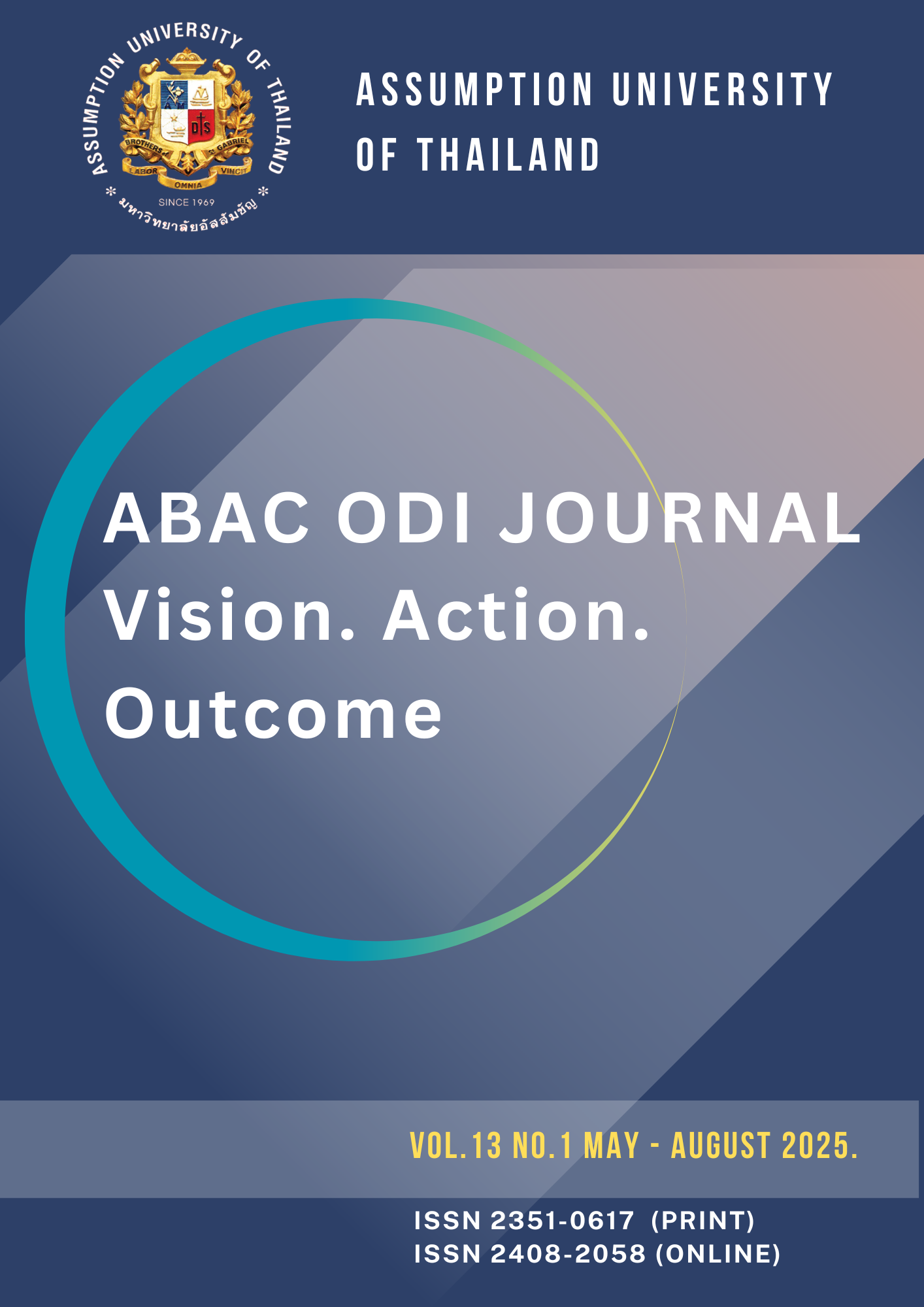Motivation, Emotional Intelligence, Work Ethics and Job Performance: An Action Research in a Small-Medium Enterprise in Yangon, Myanmar
DOI:
https://doi.org/10.14456/abacodijournal.2025.21Keywords:
Work Ethics, Emotional Intelligence, Motivation, Job Performance, Organizational DevelopmentAbstract
The purpose of this action research study is to improve employees’ job performance using Organizational Development interventions to enhance their motivation, emotional intelligence, and work ethics in a small-medium enterprise in Yangon, Myanmar. Guided by frameworks such as SOAR and the Weisbord Six-Box Model, the study employs a mixed-method approach, incorporating quantitative surveys and qualitative interviews, to diagnose organizational challenges and implement tailored development interventions. Quantitative data were collected through structured questionnaires and analyzed using means, standard deviations, and paired sample t-tests. Data was analyzed using means, standard deviations and paired sample t-tests, to evaluate employees’ work ethics, motivation, emotional intelligence and employee job performance. For qualitative methods, data were collected using semi-structured interviews to understand the current situation of Nature’s Own Company Limited in Yangon, Myanmar and identify key areas of improvement to improve employee job performance. Key findings demonstrate that targeted ODIs implemented helped enhance emotional intelligence, foster ethical work practices, and strengthen intrinsic as well as extrinsic motivation, and significantly improved employee performance. The research further emphasizes the critical role of strategic alignment between organizational goals and employee development in cultivating a productive and engaged workforce. By presenting a structured approach to organizational development interventions, this study offers practical insights for fostering sustainable growth and competitive advantage in similar organizational contexts.
References
Boyatzis, R. E., Goleman, D., & Rhee, K. (2000). Clustering competence in emotional intelligence: Insights from the Emotional Competence Inventory (ECI). In R. Bar-On & J. D. A. Parker (Eds.), Handbook of emotional intelligence: Theory, development, assessment, and application at home, school, and in the workplace (pp. 343-362). Jossey-Bass.
Burke, W. W. (2017). Organization change: Theory and practice (5th ed.). SAGE Publications.
Campbell, J. P., & Wiernik, B. M. (2015). The modeling and assessment of work performance. Annual Review of Organizational Psychology and Organizational Behavior, 2(1), 47-74. https://doi.org/10.1146/annurev-orgpsych-032414-111427
Cronbach, L. J. (1951). "Coefficient alpha and the internal structure of tests." Psychometrika, 16(3), 297-334.
D’Alo, G., Soares, C., & Vieira, P. (2017). The relationship between employee performance and compensation: Rethinking remuneration practices. Journal of Business and Organizational Behavior, 12(3), 45-61.
Diao, X., Masias, I., & Lwin, W. Y. (2020, December). Agri-Food Trade in Myanmar: Its role in Myanmar’s future economic takeoff. https://themimu.info/sites/themimu.info/ files/assessment_file_attachments/IFPRI_Myanmar-SSP_WP06.pdf
Etactics. (2023). Ethics training for employees: Why it’s important & what it looks like.
Emtrain. (2024). The essentials of ethics training for employees. https://emtrain.com
Freedman, J., & Fariselli, L. (2016, March 25). Whitepaper: & emotional intelligence & and Success. https://rw360.org/wp-content/uploads/2016/03/Six-Seconds-EQ-and-Success-White-Paper.pdf
Ganhão, T., Fernandes, C., & Santos, T. (2021, June). Public employee motivation in Eupan. https://www.eupan.eu/wp-content/uploads/2021/10/Motivation_study_2021.pdf
Gauld, R. (2016). Principal-agent theory of Organizations. Springer. https://doi.org/10.1007/978-3-319-31816-5_72-1
Groenewald, L., & Geerts, S. (2013). The South African Business Ethics Survey 2013. Ethics Institute of South Africa.
Htun, S., Chakkararvarthy, M., & Bhaumik, A. (2024). Impact of different leadership styles on employees’ job performance in the food and beverage industry in Myanmar. International Journal of Advances in Engineering and Management, 6(1), 398-405. https://doi.org/10.35629/5252-0612398405
IndexBox. (2023). Myanmar: Jams, jellies, puree and pastes market analysis, forecast, size, trends, and insights. https://www.indexbox.io/store/myanmar-jams-jellies-puree-and-pastes-market-analysis-forecast-size-trends-and-insights/
Jacobs, C., & Kaplan, S. (2016). Getting the most out of SOAR: A strategic planning tool for collaborative organizations. SAGE Publications.
Jiménez-Picón, N., Romero-Martín, M., Ponce-Blandón, J. A., & Gómez-Salgado, J. (2021). The relationship between mindfulness and emotional intelligence as a protective factor for healthcare professionals: Systematic review. International Journal of Environmental Research and Public Health, 18(10), 5491. https://doi.org/10.3390/ijerph18105491
Kaizen Institute. (2023). Building a continuous improvement culture. https://kaizen.com
Kallio, H., Pietilä, A. M., Johnson, M., & Kangasniemi, M. (2016). Systematic methodological review: Developing a framework for a qualitative semi‐structured interview guide. Journal of Advanced Nursing, 72(12), 2954-2965.
Leading Business Improvement. (2023). Employee engagement in continuous improvement.
https://leadingbusinessimprovement.com
Locke, E. A., & Latham, G. P. (2019). A theory of goal setting and task performance. Routledge.
Merriam, S. B., & Tisdell, E. J. (2016). Qualitative research: A guide to design and implementation (4th ed.). John Wiley & Sons.
Nickerson, C. (2023, September 28). Herzberg’s two-factor theory of motivation-hygiene. Simply Psychology.
https://www.simplypsychology.org/herzbergs-two-factor-theory.html#
Rovinelli, R. J., & Hambleton, R. K. (1977). On the use of content specialists in the assessment of criterion-referenced test item validity. Dutch Journal of Educational Research, 2(2), 49-60.
Sang, L., & Fang, J. (2019). Leadership style of Myanmar hotel managers: Culture as a hindrance in moving towards democratic/participatory style from autocratic style. International Journal of Knowledge Management and Tourism Hospitality, 2(2), 180-202. https://doi.org/10.1504/IJKMTH.2019.107824
Stavros, J. M., Cooperrider, D. L., & Kelley, D. L. (2003). SOAR: A new approach to strategic planning. AI Practitioner, 5(4), 10-17.
Yatu. (2019). Labor rights challenges in the private and small enterprises in Yangon, Myanmar. SHAPE SEA.
https://shapesea.com/wp-content/uploads/2019/05/WP-Yatu-Final.pdf
YCP. (2018, July 10). Myanmar struggles to build a skilled workforce despite its growing young population. YCP Group. https://ycp.com/insights/article/myanmar-struggles-to-build-skilled-workforce-despite-its-growing-young-population




